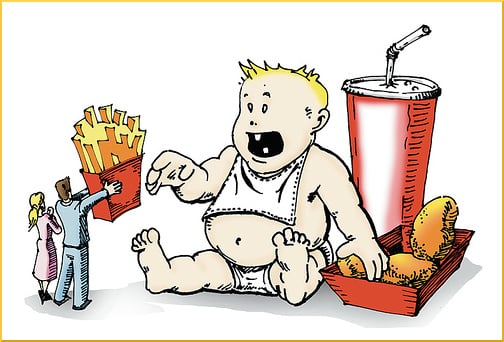
Yes, we will get to McDonald’s, but first, one leftover note from the recent posts on pacifiers and their causative effect (or lack thereof) on obesity. Dr. Pretlow has reflected:
Kids probably never completely outgrow the pacifier effect, as illustrated by grownups sucking on a lollipop, a straw, or a popsicle. Could overeating by kids to relieve stress and unhappiness be partly due to the persisting pacifier effect? If so, non-calorie pacifiers, like carrots or celery may help.
The idea of sucking on a nicely carved stalk of carrot or celery, rather than a lollipop, straw, popsicle, cigar, toothpick, or swizzle stick, is an intriguing one. Helpful how-to lists do not often suggest it, maybe because some people feel that vegetables are to be eaten, not toyed with.
Maybe they feel that if they experimented with using a hunk of carrot or celery as a pacifier the temptation would be too strong and they would just go ahead and chew it up. But if that happened, how much harm would be done? The calories are few, and chewing burns up some of them, and it stimulates blood flow to the brain, so the risk is not really significant in most cases.
Of course the temptation to eat it would be a factor, because chewing is also an oral activity that promotes emotional satisfaction. Are all oral activities interchangeably satisfying? Is it a personality thing? Are chewers generally more aggressive? People who are locked into the pacifier effect, are they more dependent and needy? Once psychology is added to the obesity playbook, it seems like anything goes.
Psychology and McDonald’s
A fast-food exec believes that the public should regard his product as “A tasty reward for everyday living.” Childhood Obesity News has discussed how advertising is designed to work on people’s vulnerable underbellies. Its uncanny power is, incidentally, a good argument for the proposition that obesity is properly the turf of psychologists and psychiatrists.
Advertising stimulates our fear of being different and being left out. It plays into our primeval terror of being exiled from the tribe, which in ancient times was a death sentence. Overcoming primeval fears is also shrink territory. So much of this stuff is in our heads. It should not be possible to convince a sane person that a pile of salty carbs and grease — that you pay for! — is, in any sense of the word, a reward.
The very fact that the expression “tasty reward for everyday living” could even mean anything demonstrates that psychological fine-tuning is needed. Not to get all meta, but in actuality, what every person deserves is a life so vibrantly fulfilling and rewarding that the lure of a fast-food orgy is the least attractive of our many alluring options.
The famous slogan “You deserve a break today” was the creation of Keith Reinhard, who attributed its power to the fact that it “granted consumers permission to indulge in a fast-food meal at McDonald’s.” That word — “indulge” — turned up in a recent post. To some people the word has very negative connotations.
How does therapy combat this?
Therapy can help people understand that they do not necessarily need to do everything they have permission for. Therapy helps us discover what can be done. It also, vitally, helps us understand that not everything that can be done should be done. Being a grownup means you can eat five pounds of chocolate-covered bacon at one sitting. Being a grownup in therapy means you don’t.
To give up food as a reward does not have to be devastating. One feature of therapy is that it can help a person identify other and better rewards. All in all, it appears that a very key event in the personal war against obesity is the transformation of the “I deserve a break today” mindset into the “I deserve the best every day” mindset. Again, this is an indication that obesity prevention is squarely in the psychology/psychiatry wheelhouse.
Your responses and feedback are welcome!
Source: “McDonald’s Drops Rights to ‘You Deserve a Break’,” HuffingtonPost.com, 11/11/14
Photo credit: Joe_13 via Visualhunt/CC BY-ND

 FAQs and Media Requests:
FAQs and Media Requests: 











